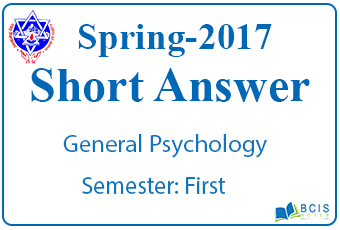
Very Short Questions Spring 2017
The answers to the Very Short Questions Spring 2017 are given below:
1. Point out the sub-fields of psychology.
ANS- The sub-fields of psychology are:
- Clinical psychology
- Developmental Psychology
- Forensic psychology
- Industrial-Organizational Psychology
2. What do you understand by emotion?
ANS- In psychology, emotion is often defined as a complex state of feeling that results in physical and psychological changes that influence thought and behaviour. Emotionality is associated with a range of psychological phenomena, including temperament, personality, mood, and motivation.
3. Differentiate between the function of rod cells and cone cells.
ANS-
| BASIS OF COMPARISON | RODS | CONES |
| Description | Rods are a rod-shaped, light-sensitive cell which lies on most peripheral parts of the retina in the vertebrate eye. | Cones are a type of photoreceptor in the retina which is responsible for colour vision in daylight. |
| Location | Rods are located in the periphery of the retina. | They are located at the central part (fovea) of the retina. |
4. What is the Literal meaning of prejudice?
ANS- Prejudice can be an affective feeling towards a person based on their perceived group membership. The word is often used to refer to a preconceived (usually unfavourable) evaluation or classification of another person based on that person’s perceived political affiliation, sex, gender, beliefs, values, etc.
5. List out the different theories of learning.
ANS- 4 Theories of learning are Classical Conditioning, Operant Conditioning, Cognitive Theory, and Social Learning Theory. Learning is the individual growth of the person as a result of cooperative interaction with others.
6. What is a retrieval cue in memory?
ANS- One process that can improve the likelihood of remembering previously learned knowledge are retrieval cues. Retrieval cues are any stimulus or words that help us remember stored memories. These cues can be just about any sort of stimulus, from familiar sounds, to sights, to smells.
7. How do you find out the individual I.Q?
ANS- IQ was a score obtained by dividing a person’s mental age score, obtained by administering an intelligence test, by the person’s chronological age, both expressed in terms of years and months. The resulting fraction (quotient) was multiplied by 100 to obtain the IQ score.

8. Define Id, ego, and Superego.
ANS- Id, ego, and super-ego. The Id, ego, and super-ego are ideas created by Sigmund Freud. They are three concepts used to explain the way the human mind works. Freud describes the human mind as the interaction of id, ego, super-ego. The ego, and to some extent the super-ego, is conscious or on the surface.
9. Define eustress.
ANS- A positive form of stress having a beneficial effect on health, motivation, performance, and emotional well-being during positive stress (“eustress”), such as a promotion or vacation, feel-good chemicals called endorphins are released.
10. Why pituitary glands are known as master glands?
ANS- The pituitary gland is the main endocrine gland. It is a small structure in the head. It is called the master gland because it produces hormones that control other glands and many body functions including growth. The pituitary consists of the anterior and posterior pituitary.
You may also like Pokhara University || Spring 2017 || General Psychology

Leave a Reply